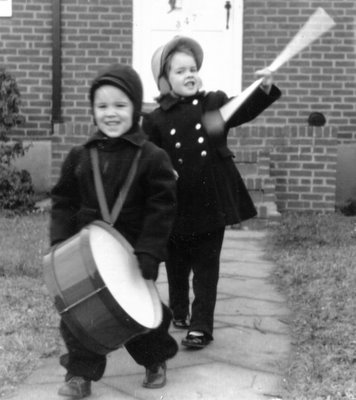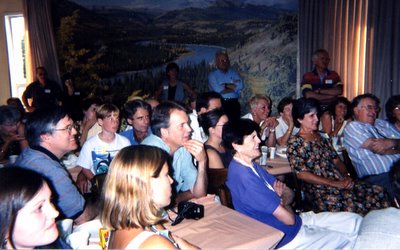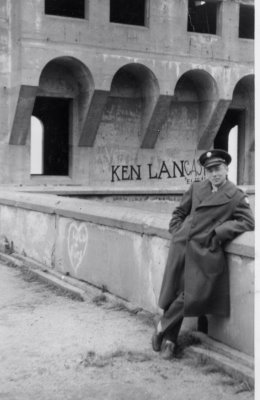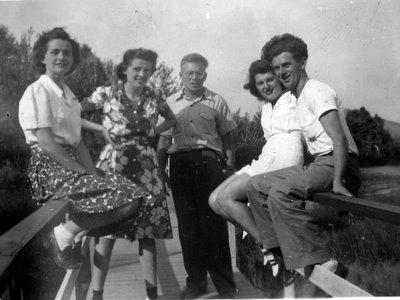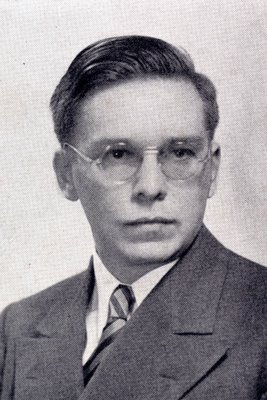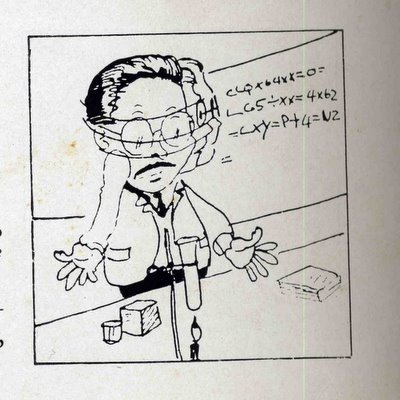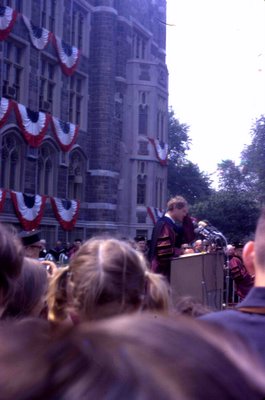
This is a picture of Robert Kennedy speaking at my graduation from Fordham University in 1967. Do I have to explain who he is? The younger brother of President John Kennedy, he served as Attorney General, then became Senator from New York. He was running for president in 1998 when he was assassinated June 5, ten days before my wedding to Chris Hawkins. I remember I had a final wedding dress fitting the day after the assassination, and I was in tears most of the time.
In the midst of a heated debate between Uncle Ken and the younger generation, I posted this account of my political evolution. I would love to hear everyone else's stories.
My first specific political memory centered around the duck and cover, hide under our desks, exercises that were a regular feature of my early school life from age 5 on. I knew enough about nuclear war to be terrified. We lived near to an air force base and I used to go out to the backyard, look up at the planes, and try to determine if they were American or Russian. I remember getting a book out of the library on aircraft identification. When I heard Joseph Stalin died, I remember asking if that meant no one would drop bombs on us.
In 1954 I had a severe case of the measles and Grandma Nolan came to help nurse me. She was listening to the Joseph McCarthy army hearings. Hatred of McCarthy's voice
might have shaped my entire political development. The other determining force was my obsession with John F. Kennedy. I first took an interest in political conventions in 1956, when I was 11. Kennedy made a brief try for the vice presidential nomination, and my mom mentioned he was Catholic, that there had never been a Catholic president. From 1956 to 1963, I read everything I could about Kennedy. When I was 15 I did volunteer work for his presidential campaign.
In high school we had political debates to imitate the famous Kennedy/Nixon debates and I represented Kennedy. What he believed in, I believed in. Gradually I moved to the left of his pragmatic liberalism. Certainly Kennedy was responsible for my decision to major in political science in college.
I cannot precisely date my interest in and commitment to civil rights. When I was a freshman, I joined my college's Interracial Understanding Group. I was envious of those college students who have the affluence to spend the summer down south registering voters and didn't have to worry about money to pay their tuition. Kennedy's assassination, occurring in the fall of my freshman year in college, devastated me. I felt like there had been a death in my immediate family. I quickly translated my political allegiance to Bobby Kennedy.
Gradually during college I became a pacifist. Opposition to the Vietnam War right from the beginning was the catalyst. My husband to be, Chris, applied for conscientious objector status and was willing to face jail rather than be inducted. We became very active in the Catholic Peace Fellowship, the Fellowship of Reconciliation, and the War Resister's League, all pacifist organizations. We went on several anti-war demonstrations both in New York and Washington. I briefly attended Stanford University where resistance to the war was at its height. Almost every afternoon, David Harris, Joan Baez's future husband, spoke out eloquently against the war.
My first job after Stanford was as an assistant to Victor Riesel, a labor columnist, who had been blinded by acid thrown in his face by the mob who controlled the waterfront he was exposing. One of my assigments was to read the AP ticker to him every day, clip articles in all the newspapers, labor papers. This was in 1968, when King and Kennedy were assassinated, when anti-war protect was at its height.
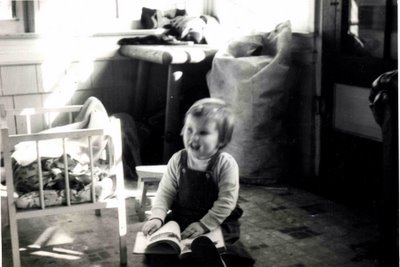
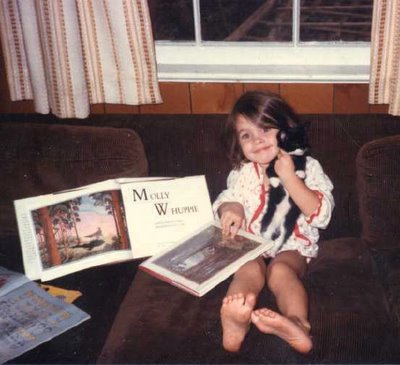 This picture was taken at Grandma Nolan's house, February 1, 1947, the day before Richard was born. I was 18 months old. Patricia was three when she read regularly to her kitten. In my baby book Mom wrote: "A book worm--she loved all books. At 2 years her favorites were Dumbo, Children's Garden of Verses, Alice in Wonderland. Was always eager for Cinderella, Goldilocks, etc." Under my favorite books, she listed Daddy's and Uncle George's yearbook, Mother Goose, all magazines, ABC book. Later I wrote in Nancy Drew.
This picture was taken at Grandma Nolan's house, February 1, 1947, the day before Richard was born. I was 18 months old. Patricia was three when she read regularly to her kitten. In my baby book Mom wrote: "A book worm--she loved all books. At 2 years her favorites were Dumbo, Children's Garden of Verses, Alice in Wonderland. Was always eager for Cinderella, Goldilocks, etc." Under my favorite books, she listed Daddy's and Uncle George's yearbook, Mother Goose, all magazines, ABC book. Later I wrote in Nancy Drew.






